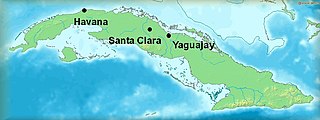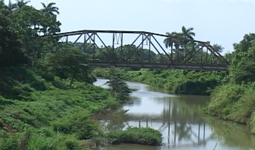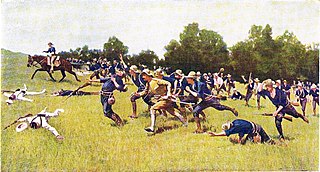Related Research Articles

The Cuban Revolution was a military and political effort to overthrow the government of Cuba between 1953 and 1959. It began after the 1952 Cuban coup d'état which placed Fulgencio Batista as head of state and the failed mass strike in opposition that followed. After failing to contest Batista in court, Fidel Castro organized an armed attack on the Cuban military's Moncada Barracks on July 26, 1953. The rebels were arrested and while in prison formed the 26th of July Movement. After gaining amnesty the M-26-7 rebels organized an expedition from Mexico on the Granma yacht to invade Cuba. In the following years the M-26-7 rebel army would slowly defeat the Cuban army in the countryside, while its urban wing would engage in sabotage and rebel army recruitment. Over time the originally critical and ambivalent Popular Socialist Party would come to support the 26th of July Movement in late 1958. By the time the rebels were to oust Batista the revolution was being driven by the Popular Socialist Party, 26th of July Movement, and the Revolutionary Directorate of March 13.

Calixto García Íñiguez was a Cuban general in three Cuban uprisings, part of the Cuban War for Independence: the Ten Years' War, the Little War, and the War of 1895, itself sometimes called the Cuban War for Independence, which bled into the Spanish–American War, ultimately resulting in national independence for Cuba.

Elections in Cuba are held at municipal, provincial, and national levels. Cuba is a one-party state, with the Communist Party of Cuba being described as the "superior driving force of the society and the state" in the Constitution of Cuba, and the communist party is the only official political party. Elections in Cuba are not considered democratic because the government does not allow free and fair voting.

Nuevitas is a municipality and port town in the Camagüey Province of Cuba. The large bay was sighted by Christopher Columbus in 1492.

Florida is a municipality and city in the Camagüey Province of Cuba. It is located 40 km (25 mi) north-west of Camagüey, along the Carretera Central highway. The city was established in 1907, and the municipality was established in 1924. Of all the municipalities of the Cuban province of Camagüey, Florida is third in area size. The name is Spanish for Land of flowers.

The Battle of Yaguajay was a decisive victory for the Cuban Revolutionaries over the soldiers of the Batista government near the city of Santa Clara in Cuba during the Cuban Revolution.

San Cristóbal is a municipality and city which since 2011 has been included in Artemisa Province of Cuba. It was previously part of Pinar del Río Province.

Candelaria is a municipality and town in the Artemisa Province of Cuba. Before 2011 it was part of Pinar del Río Province. It was founded in 1809, and established as a municipality in 1880.

Los Palacios is a municipality and town in the Pinar del Río Province of Cuba. It was founded in 1760.

Corralillo is a municipality and town in the Villa Clara Province of Cuba. It was founded in 1831 and established as a municipality in 1879.

Yaguajay is a municipality and town in the Sancti Spíritus Province of Cuba. It is located in the northern part of the province, and borders the Bay of Buena Vista to the north. The Caguanes National Park is located in Yaguajay.

Tercer Frente is a municipality in the Santiago de Cuba Province of Cuba. It is centered on the town, and municipal seat, of Cruce de los Baños.

Guisa is a municipality and town in the Granma Province of Cuba. It is located 19 kilometres (12 mi) south-east of Bayamo, the provincial capital.
The Mariana Grajales Women's Platoon, or Las Marianas, was an all-female military platoon created by Fidel Castro, Celia Sánchez, and Haydée Santamaría during the 26th of July Movement on 4 September 1958, named after the Cuban icon Mariana Grajales Cuello who served in the Cuban War of Independence.

The Battle of Guisa was a relevant event in the history of Cuba. One of the major victories of the Rebel Army in the Liberation War (1956-1958) sustained against the dictatorship of Fulgencio Batista in Cuba.

The Second Eastern Campaign was a military campaign that took place between August 1 to 12, 1898, in the Oriente Province of Cuba during the Cuban War of Independence. It was the shortest military campaign of the entire war and it was the one that marked the end of Spanish reign in Cuba and the Spanish Empire in Latin America.

José Manuel Capote Sosa was a Cuban Major General and politician who participated in the Cuban War of Independence. He was known as the mayor of Bayamo and the brother of Colonel Gonzalo Capote of the Cuban Liberation Army.
The Capture of Guisa was an event during the Cuban War of Independence. It took place from November 28 to 29, 1897 of the war as the Cuban forces overran the Spanish forces at the town and proceeded to burn it down.